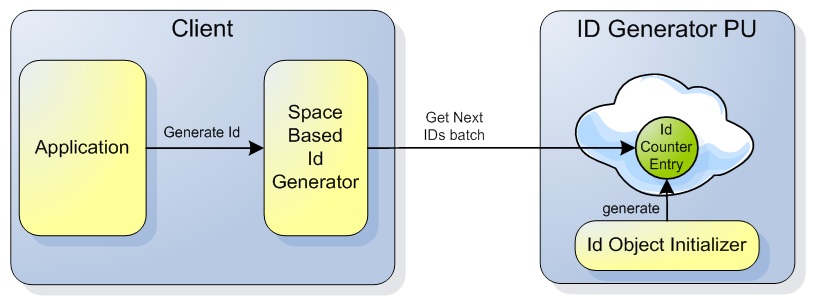Global ID Generator
| Author | XAP Version | Last Updated | Reference | Download |
|---|---|---|---|---|
| Shay Hassidim | 7.1 | Jan 2011 |
Overview
When writing objects into the space, you may need to generate a global unique ID for your space objects. The ID will be used later to fetch the object based on its ID via the readById/readByIds methods, or associate it with another object by placing the object ID as a field value within another object.
GigaSpaces generates a unique global ID when writing new objects using its built-in internal ID generator utility used when enabling the auto-generate ID property. Still, you may want to have your own custom global unique ID generator.
You can download the custom Unique Global ID Generator source code used with this example.
The following example includes a custom global unique ID generator PU and a client side utility. The Unique Global ID Generator features the following:
- Spring based configured.
- Store the last generated ID within a space object (
IdCounterEntry). - Provides range of IDs to a client application. This avoids the need to perform read and update space operations with each generated ID.
- Provides a numeric ID.
- Support persisting the
IdCounterEntryobject within a database. This allows theIdCounterEntryobject to be loaded from a database in case the Unique Global ID Generator PU is fully re-started. - Once a Unique Global ID Generator is deployed, a
IdObjectInitializeris created and generates theIdCounterEntryobject within the Unique Global ID Generator space. Only oneIdCounterEntrywill be created.

Using the ID Generator
To use the ID Generator you should:
- Deploy the ID Generator PU using the pu.xml below. You should deploy it using one partition and a backup.
- With your application, inject a
SpaceBasedIdGeneratorBean. You should have it with every application instance. - With your client application call the following when you need a unique global ID:
SpaceBasedIdGenerator idGenerator;
Integer myNextID = idGenerator.generateId();
The SpaceBasedIdGenerator using Spring Transactions to update the IdCounterEntry object.
The ID Generator Components
The following should be used to enable the ID Generator:
This is ID Generator pu.xml:
<?xml version="1.0" encoding="UTF-8"?>
<beans xmlns="http://www.springframework.org/schema/beans"
xmlns:xsi="http://www.w3.org/2001/XMLSchema-instance"
xmlns:context="http://www.springframework.org/schema/context"
xmlns:os-core="http://www.openspaces.org/schema/core"
xmlns:os-events="http://www.openspaces.org/schema/events"
xmlns:os-sla="http://www.openspaces.org/schema/sla"
xmlns:tx="http://www.springframework.org/schema/tx"
xmlns:os-remoting="http://www.openspaces.org/schema/remoting"
xsi:schemaLocation="http://www.springframework.org/schema/beans http://www.springframework.org/schema/beans/spring-beans.xsd
http://www.springframework.org/schema/context http://www.springframework.org/schema/context/spring-context.xsd
http://www.springframework.org/schema/tx http://www.springframework.org/schema/tx/spring-tx-2.0.xsd
http://www.openspaces.org/schema/core http://www.openspaces.org/schema/core/openspaces-core.xsd
http://www.openspaces.org/schema/events http://www.openspaces.org/schema/events/openspaces-events.xsd
http://www.openspaces.org/schema/remoting http://www.openspaces.org/schema/remoting/openspaces-remoting.xsd
http://www.openspaces.org/schema/sla http://www.openspaces.org/schema/sla/openspaces-sla.xsd">
<os-core:annotation-support />
<context:component-scan base-package="com.gigaspaces.idgenerator.pu" />
<os-core:giga-space-context/>
<os-core:embedded-space id="IDGeneratoSpace" name="IDGeneratorSpace" />
<os-core:local-tx-manager id="transactionManager" space="IDGeneratoSpace" />
<tx:annotation-driven transaction-manager="transactionManager" />
<os-core:giga-space id="gigaSpace" space="IDGeneratoSpace" tx-manager="transactionManager" />
<!-- ========================================================================================================== -->
<bean id="IdObjectInitializer" class="com.gigaspaces.idgenerator.pu.IdObjectInitializer">
<property name="initialValue" value="100" />
<property name="idRange" value="1000" />
</bean>
<os-sla:sla number-of-instances="1" max-instances-per-vm="1">
</os-sla:sla>
</beans>
The following should be added to your PU pu.xml used to deploy the client application:
<context:component-scan base-package="com.gigaspaces.idgenerator.client" />
<os-core:giga-space-context/>
<os-core:space-proxy id="IDGeneratoSpace" name="IDGeneratorSpace" />
<os-core:local-tx-manager id="IDGeneratortransactionManager" space="IDGeneratoSpace" />
<tx:annotation-driven transaction-manager="IDGeneratortransactionManager" />
<os-core:giga-space id="IDGeneratogigaSpace" space="IDGeneratoSpace" tx-manager="IDGeneratortransactionManager" />
<tx:annotation-driven transaction-manager="IDGeneratortransactionManager"/>
<bean id="idGenerator" class="com.gigaspaces.idgenerator.client.SpaceBasedIdGenerator"/>
